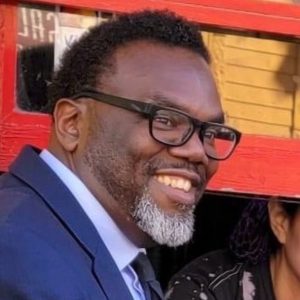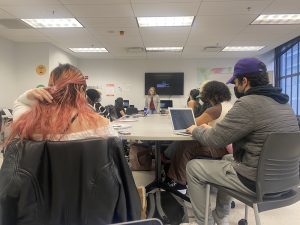
Olga Nunez likes to talk about a day last summer when she had a paintbrush in hand instead of a joint.
A summer job revamping Latino Youth, an alternative public school, kept her away from troublesome friends around the block. She wanted to paint. She wanted to live. She wanted to stay out of prison and in school.
Before last summer, the 19- year-old would show up at her previous school in Maywood for just five minutes a day before eventually dropping out. Now attending Latino Youth, sandwiched between two gang territories, Nunez is getting a second chance to earn a high school diploma.
In Little Village, downtime usually means walking the streets with neighborhood gang members, said Nunez. Jobless and available, she was recruited by mentor and Latino Youth teacher Sonia Rocha to paint the walls of the graffiti-covered institution.
“If it wasn’t for this job opportunity, I would either be selling drugs or doing drugs,” Nunez said.

In inner-city Chicago, the majority of teens and young adults grapple with unemployment on a daily basis. They have families to feed and bills to pay. And only a few jobs so it’s easy to turn to drugs, Nunez said. Struggling with money herself, Nunez would sell weed.
“That’s how it is. You’re gonna go for the drugs because it’s easy,” she said.
Although her six-week summer job last year kept her out of trouble, once it was over, she said it was tempting to go back to the streets because she had less purpose.
The lack of money inevitably draws individuals like Nunez to the drug trade.
Tracy Siska, executive director of the Chicago Justice Project, said that at a time when money is needed most, the drug market unfortunately proves to be the quicker route.
“Sling rock or be poor,” Siska said of the tough limitations people like Nunez might face. But it can be avoided, he said.
“Jobs need to consider hiring those with a scarce resume for the sake of a future generation,” Siska said.
Jack Wuest, executive director of the Alternative Schools Network, cannot stress the importance of employment enough.
Youth unemployment starts with money: the lack thereof and the means to gain it. Wuest said the city and state is strapped for funds, and that’s what’s needed to pay for drug outreach programs and to create more work.
“Joblessness is debilitating,” Wuest said.
Like Nunez, 18-year-old Deleon Bush from Innovations High School knows a thing or two about being without a job. He spoke at “the power of a job” youth hearing last month— at theChicago Urban League—about a summer job that “woke him up.” Through some experience, he then landed a job at TJMaxx last October. But his first source of legal income was only a two-week gig.
Cesario Williams, youth leader at Chicago Area Project, said those short-lived opportunities provide false hope.
Which is something Bush can relate to.
“I was right back to where I started, even though I didn’t want to be,” he said.
Bush said his father has been locked up in prison for 15 years while his single mother struggled to get by.
“Before I even got the job, I was a fatherless man in the house, and the only way I was getting money was selling weed and crack,” he said.
Bush is trying to keep off the streets and focus on getting his grades back up, but he said the police still harass him because they know he used to deal.
“They think every black person is bad,” Bush said.
According to a recent report by the Alternative Schools Network, unemployment for black male teens in Chicago has reached 92 percent. And Siska said youth unemployment in Chicago shares a close tie with the drug scene.
Despite their unemployment status, Nunez and Bush both have a plans for the future. Bush wants to graduate from high school and eventually enroll in the Army as an officer, and Nunez feels fortunate to have been given a paint brush. It kept her out of danger and working towards a college education at Malcolm X. One day she hopes to be a registered nurse.
“I want to get out of here. Not like the rest of these kids who are either dead or in prison,” she said.











Be First to Comment